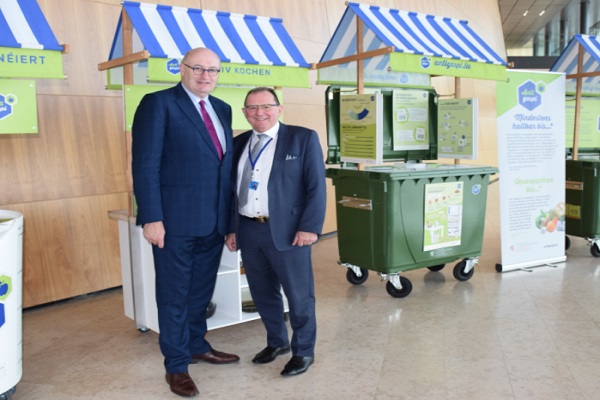 L-R: Phil Hogan, European Commissioner for Agriculture and Rural Development; Fernand Etgen, Minister of Agriculture, Viticulture and Consumer Protection;
Credit: MAVPC
L-R: Phil Hogan, European Commissioner for Agriculture and Rural Development; Fernand Etgen, Minister of Agriculture, Viticulture and Consumer Protection;
Credit: MAVPC
Luxembourg Minister of Agriculture, Viticulture and Consumer Protection Fernand Etgen participated yesterday in the Agriculture and Fisheries Council, held in Kirchberg under the chairmanship of Bulgaria.
Monday’s Agriculture and Fisheries Council centred around combatting food waste. The fight against food waste is one of the biggest challenges of the coming decades. According to the United Nations Food Organisation (FAO), 1.3 billion tonnes of the edible portion of food for human consumption is wasted or lost in the world- the equivalent of ⅓ of food produced.
During the Ministers' exchange of views on ways to reduce food waste in the EU, Fernand Etgen insisted on the necessity of a common methodology at the EU level and welcomed the work going on in the EU in that sense.
As the Council took place in Luxembourg, Minister Fernand Etgen took the opportunity to give his European counterparts a brief overview of the Luxembourg awareness campaign "together against food waste", namely that the travelling exhibition of the Ministry of Agriculture, Viticulture and Consumer Protection was presented at the Council entrance.
In his presentation, Fernand Etgen also reviewed all the initiatives of the Luxembourg awareness campaign (www.antigaspi.lu), while insisting on the "solidarity pact" which has so far been signed. by ¾ Luxembourg municipalities representing more than 85% of the population. Indeed, close to the citizens, the municipalities help to raise awareness in turn the population through creative actions. The Luxembourg Minister also stressed the importance of training in this area, which is why specific training courses dealing with food waste reduction in the respect of food safety constraints are aimed at both catering professionals and municipal officials, have been developed with the support of the Agriculture Ministry.
A second major point of this Council was the Ministers' first exchange of views on the Commission's proposal to improve the transparency of the food safety risk assessment procedure. In this context, Fernand Etgen pointed out that the recent debates on the authorisation of glyphosate have demonstrated that European citizens demand more transparency in this procedure, while also demanding a guarantee of the independence of the agencies in charge of evaluations. This proposal is therefore a first step in the right direction, in particular the creation of a public register of scientific studies on which risk assessments are based, as well as the access of citizens to all information relating to applications for authorisation.
The Minister of Agriculture of Viticulture and Consumer Protection also welcomed the possibility given by the Commission to carry out verification studies, in case of doubt about the studies submitted by the industry, as well as the reform proposed governance of EFSA.
The Council also took note of the Commission's presentation of a draft directive on unfair commercial practices in the food supply chain. The aim is to propose an EU-wide legal framework to combat these unfair commercial practices, with the aim of strengthening the position of farmers in the food chain.
Outside of the Council, Fernand Etgen also had a bilateral interview with his Austrian counterpart Elisabeth Köstinger, during which they discussed the main issues that will be on the agenda during the Austrian presidency, which starts on 1 July. This includes the post-2020 CAP reform, whose legislative proposals are expected by the end of May.








